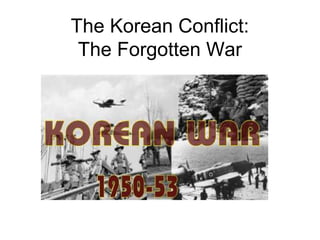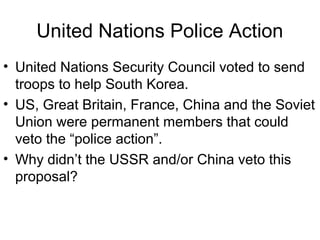The Korean War began in 1950 when North Korea invaded South Korea, sparking a war between communist and capitalist forces on the Korean Peninsula. The United Nations backed South Korea and coordinated an international effort to defend it from the North Korean invasion. Key events included the Pusan Perimeter stabilizing the front line in the south, the amphibious invasion at Inchon turning the tide, Chinese forces intervening on North Korea's side, and an eventual stalemate developing around the 38th parallel border. Over 2 million military casualties resulted and Korea remains divided to this day without a peace treaty ending the war.










































